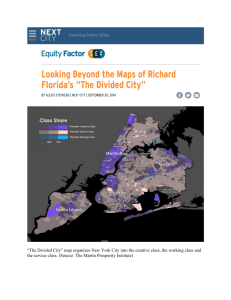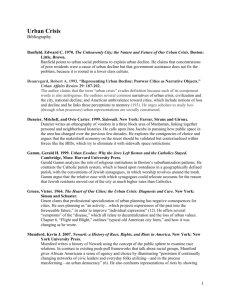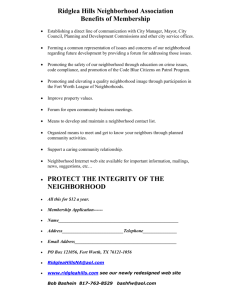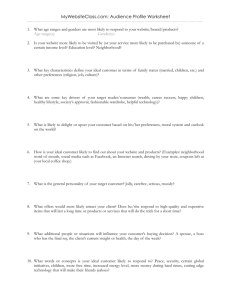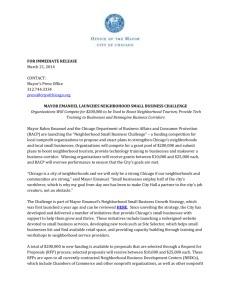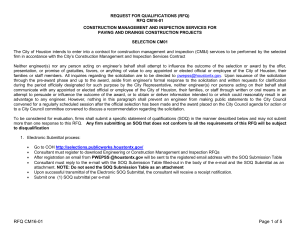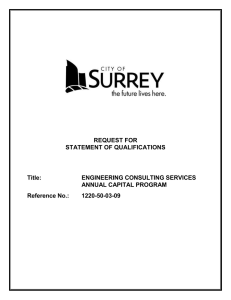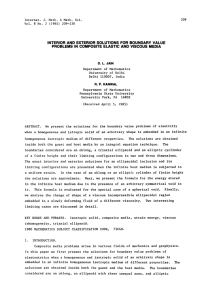RFQ - Generation All Chicago
advertisement
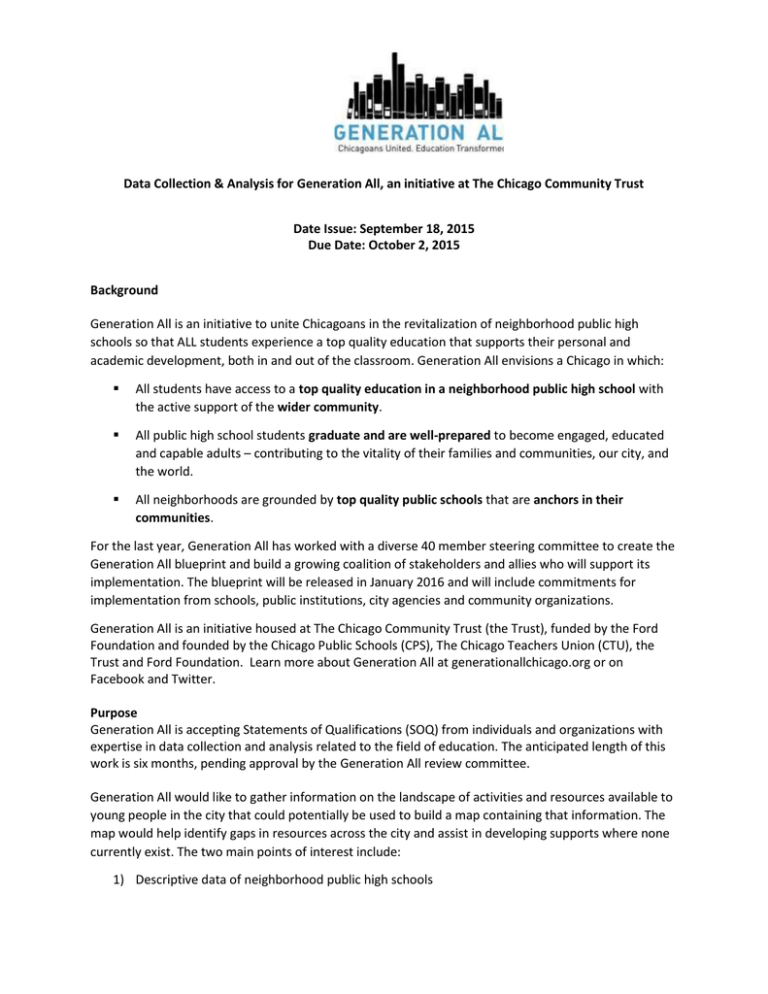
Data Collection & Analysis for Generation All, an initiative at The Chicago Community Trust Date Issue: September 18, 2015 Due Date: October 2, 2015 Background Generation All is an initiative to unite Chicagoans in the revitalization of neighborhood public high schools so that ALL students experience a top quality education that supports their personal and academic development, both in and out of the classroom. Generation All envisions a Chicago in which: All students have access to a top quality education in a neighborhood public high school with the active support of the wider community. All public high school students graduate and are well-prepared to become engaged, educated and capable adults – contributing to the vitality of their families and communities, our city, and the world. All neighborhoods are grounded by top quality public schools that are anchors in their communities. For the last year, Generation All has worked with a diverse 40 member steering committee to create the Generation All blueprint and build a growing coalition of stakeholders and allies who will support its implementation. The blueprint will be released in January 2016 and will include commitments for implementation from schools, public institutions, city agencies and community organizations. Generation All is an initiative housed at The Chicago Community Trust (the Trust), funded by the Ford Foundation and founded by the Chicago Public Schools (CPS), The Chicago Teachers Union (CTU), the Trust and Ford Foundation. Learn more about Generation All at generationallchicago.org or on Facebook and Twitter. Purpose Generation All is accepting Statements of Qualifications (SOQ) from individuals and organizations with expertise in data collection and analysis related to the field of education. The anticipated length of this work is six months, pending approval by the Generation All review committee. Generation All would like to gather information on the landscape of activities and resources available to young people in the city that could potentially be used to build a map containing that information. The map would help identify gaps in resources across the city and assist in developing supports where none currently exist. The two main points of interest include: 1) Descriptive data of neighborhood public high schools a. Using criteria developed in partnership with Generation All and CPS, develop a concrete list of neighborhood high schools (currently, this could include between 50- 60 schools) including a description of the populations and communities they serve b. Describe student population over time including demographics and a range of student outcomes c. Describe the teacher and staff positions (administrative support services, etc.) available over time d. Describe course offerings and student academic programs by type of high school over time 2) A study of how many and to what extent high schools have partnerships with outside organizations to improve the quality of learning and youth development opportunities for students a. Partnerships to provide extracurricular/out of school time activities such as sports programs, arts and cultural activities, leadership development, social and emotional learning, tutoring, field trips, etc. b. Partnerships to provide wraparound services such as social services, health and mental health care, housing assistance, transportation assistance, etc. c. Other types of partnerships that benefit students Additionally, Generation All would like to pursue the ethnographic case study of four to five neighborhoods that would serve to examine the following question: What has been the impact of initiatives to promote school choice (magnet, charter, selective enrollment, turnaround, contract, alternative schools, and more) on neighborhood high schools and their surrounding communities? We would like to focus on high poverty, segregated communities in particular. d. Impacts over time on neighborhood high schools should include but not be limited to: i. Enrollment, budgets, targets of budget cuts ii. Course offerings iii. Extracurricular activities and partnerships with outside organizations iv. Teacher & staff demographics, turnover rates v. Student demographics including residence in a school’s attendance boundary, mobility rates vi. Student achievement bluntly measured through GPAs, test scores, graduation rates vii. School leadership & interactions with CPS central office viii. Discipline polices, school climate ix. Intangibles such as student & teacher pride in the school, morale, sense of possibility x. Use this Catalyst issue dedicated to Marshall HS as an exemplary e. Impacts over time on the surrounding neighborhoods should include but not be limited to: i. Neighborhood population & demographics ii. Business and housing development iii. Incidences of violence iv. Median household income, homeownership rates v. Intangibles such as sense of community cohesion, pride, residents’ trust in public officials, etc. Submittal of Statement of Qualifications The SOQ must be submitted electronically to amclaren@cct.org by October 2, 2015. Definition of Request for Qualification (RFQ) This RFQ is an invitation by Generation All to organizations and individuals to submit their qualifications. Submitting a document does not ensure that Generation All will award a contract to the applicant. Cover Sheet: All organizations and individuals must provide the following information on their cover sheet. a. Organization’s or individual’s name. b. Organization’s or individual’s mailing address. c. Federal Tax Number. d. Number of employees by job classification, and education. Body: All organizations and individuals are required to provide the following information in the body of their SOQ: a. A one-page summary of the organization or individual, specifically highlighting qualifications related to the data collection and analysis in the field of education and identifying the types of educational programs and initiatives you or your organization is most qualified to analyze, as well as knowledge and expertise in specific types of data collection and methods of analysis. b. A list of all data collection and analysis projects completed in the last two years, including the name of the project and the organization for which you completed the work. In the case of grant funded programs, also include the name of the grant funding entity (e.g. US Department of Education or private foundations), the amount of the grant award, and the amount of your contract. c. Current data collection and analysis commitments and staff availability for school year 2015-16. d. Proposed budget for this project. e. The organization’s or individual’s statement of diversity regarding board and staff membership. f. A list of any unresolved or resolved claim for professional negligence or breach of professional services agreement or for indemnity (because of such alleged negligence or breach of contract) during the last five (5) years. g. Two references with complete contact information. Attachments All organizations and individuals are required to provide a complete resume of the Principal Investigator and all other key personnel potentially involved in the work. Selection of Organizations and Individuals for the Prequalification List Generation All staff will evaluate each SOQ submitted. Organizations and individuals must clearly demonstrate in the SOQ that they have sufficient qualifications and expertise for the type of work requested. Meetings with potential contractors will be conducted in early October. Due to limited resources, only applications from Chicago-area organizations and individuals will be considered. Contracts and Independent Contract Agreements The selected organization or individual will contract with the Chicago Community Trust foundation to conduct this work for the Generation All initiative. Notification All organizations and individuals will be notified if they are selected for services.
